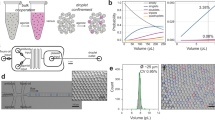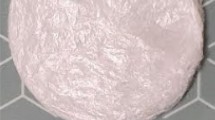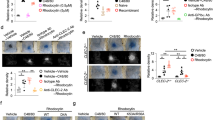Abstract
Born and Paylirig Wright1 found that the blood platelets of weanling guinea-pigs fed on a scorbutogenic diet show decreased adhesiveness. These results suggested to them that the haemorrhages of scurvy might be caused either by the failure of the platelets to adhere to form effective haemostatic plugs, or because of some unexplained mechanism, to maintain normal capillary resistance. We have repeated these experiments and, in addition to measuring the adhesiveness of platelets to glass, we have studied the formation of haemostatic plugs by direct observation.
This is a preview of subscription content, access via your institution
Access options
Subscribe to this journal
Receive 51 print issues and online access
$199.00 per year
only $3.90 per issue
Buy this article
- Purchase on Springer Link
- Instant access to full article PDF
Prices may be subject to local taxes which are calculated during checkout
Similar content being viewed by others
References
Bora, G. V. R., and Payling Wright, H., Lancet, i, 477 (1967).
Kellie, A. E., and Zilva, S. S., Biochem. J., 35, 783 (1941).
Honour, A. J., and Ross Russell, R. W., Brit. J. Exp. Path., 43, 350 (1961).
Emmons, P. R., Harrison, M. J. G., Honour, A. J., and Mitchell, J. R. A., Lancet, ii, 603 (1965).
Author information
Authors and Affiliations
Rights and permissions
About this article
Cite this article
HARRISON, M., HONOUR, A. Haemostatic Plugs in Experimental Scurvy. Nature 216, 1119–1120 (1967). https://doi.org/10.1038/2161119a0
Received:
Published:
Issue Date:
DOI: https://doi.org/10.1038/2161119a0
Comments
By submitting a comment you agree to abide by our Terms and Community Guidelines. If you find something abusive or that does not comply with our terms or guidelines please flag it as inappropriate.



